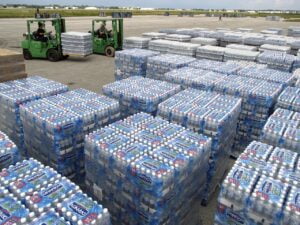 Bottled water, touted for its convenience and purity, has long been a staple in the lives of many. However, recent scrutiny has unearthed a host of concerns that prompt us to reevaluate its merits. Let’s explore both sides of the bottled water debate to gain a comprehensive understanding of its impacts.
Bottled water, touted for its convenience and purity, has long been a staple in the lives of many. However, recent scrutiny has unearthed a host of concerns that prompt us to reevaluate its merits. Let’s explore both sides of the bottled water debate to gain a comprehensive understanding of its impacts.
Pros of Bottled Water
- Convenience: One of the primary reasons people opt for bottled water is its convenience. It’s readily available in various sizes and formats, making it easy to grab on the go or stock up for emergencies.
- Perceived Purity: Bottled water often carries an aura of purity, reassuring consumers about the quality of what they’re drinking. This perception can be particularly appealing in areas where tap water quality is questionable.
- Safety: In situations where tap water may be contaminated or unavailable, bottled water provides a reliable alternative. It is especially true during natural disasters or emergencies.
Cons of Bottled Water
- Cost Discrepancy: Perhaps one of the most glaring drawbacks of bottled water is its cost compared to tap water. Bottled water can be significantly more expensive (up to 2,000 times), leading to financial strain for consumers, particularly those on tight budgets.
- Quality Concerns: Despite claims of purity, bottled water isn’t immune to quality issues. Instances of contaminants, such as arsenic in certain brands, e.g. Fiji Water, raise doubts about its superiority over tap water. Furthermore, lax regulations contribute to uncertainty about the safety of bottled water.
- Environmental Impact: The environmental toll of bottled water is substantial. Plastic bottle production contributes to pollution and depletes finite resources, exacerbating issues like climate change and ocean pollution. Additionally, the disposal of plastic bottles contributes to overflowing landfills and harms ecosystems.
- Manufactured Demand: Bottled water companies often capitalize on fear and convenience to drive demand, perpetuating a cycle of consumption that prioritizes profit over sustainability. This manufactured demand not only contributes to environmental degradation but also exploits consumers’ concerns for financial gain.
Conclusion
While bottled water offers convenience and perceived purity, its drawbacks cannot be ignored. From exorbitant costs to environmental degradation and quality concerns, the impacts of bottled water extend far beyond individual consumption. As consumers, it’s essential to weigh these factors carefully and consider more sustainable alternatives. They include reusable water bottles and supporting initiatives aimed at improving tap water infrastructure. By making informed choices, we can mitigate the negative effects of bottled water and move towards a more sustainable future for all.
Read about an efficient water filtration system that removes microplastics from water.

